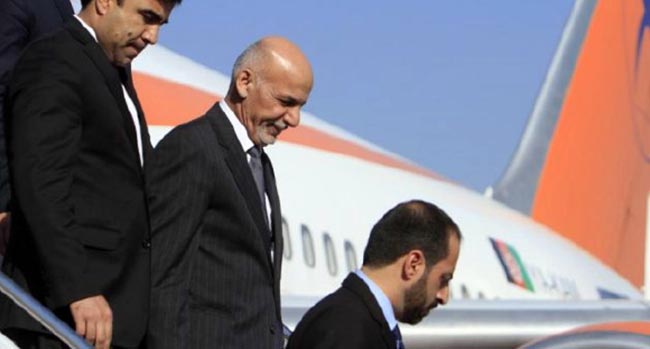Active diplomacy in the international arena reflects the tact and policy of a country. Since the establishment of the National Unity Government (NUG) the aspect of the foreign policy has been more active than the past and this trend continues with the president’s struggle and his team. President Ashraf Ghani’s trip to the neighboring and other countries such as America, China, Europe etc. is worth praise and appreciation.
The outcome of the President’s trip to three eastern countries: Australia, Indonesia and Singapore needs to be taken into account from political, cultural, technical, economic and financial perspectives. However, I will discuss shortly the outcome of this trip from economic and financial aspects:
1-Meeting with the Australian Prime Minister Malcolm Turnbull, President Dr. Muhammad Ashraf Ghani has discussed various issues such as economic cooperation and signed agreements in various fields.
2-As a result of urgent economic and financial need for the country, agreement on development cooperation for the next four years, worth $320 million dollars, have been signed between Afghan Minister of Economy and Australian Foreign Minister based on the commitments of the Brussels Conference.
3-Similarly, agreement of cooperation was signed for the purpose of Afghanistan’s capacity building in scientific and technical fields. Electronizing the government and using modern technology is in need of training experts and technicians in the field of applied sciences, including Information Technology (IT).
4-Investment opportunities were also discussed between the President and his entourage and Australian officials. No doubt, creating investment opportunities in the country and paving the ground for this are in need of security, building infrastructure such as building roads, distributing land in industrial towns with reasonable price and installments and supplying water.
5-The President also met Afghans residing Australia including businessmen and particular consideration was paid to the problems about business. Afghan traders are keen on having systematic contact with Afghanistan for various reasons but problems in this regard should be tackled by economic and commercial policy-makers in the future for commercial boom especially in export sectors.
6-Standardizing the production of agricultural goods in Afghanistan was one of the key issues for the President and his entourage on one side and his Australian counterpart and officials on the other. Considering the current capacities in this regard, Australia’s experience and transferring this to Afghanistan will bring significant progress. President’s meeting with Australian experts and discussion over managing water and land resources, standardizing agricultural products, accessing to global markets, improving livestock and increasing its exports are important for Afghanistan from different aspects.
Based on the current statistics, about 12 percent out of 652,230 square meters is arable and 18 percent, out of the current 12 percent, have been cultivated and 82 percent has the capacity of being developed for agriculture and livestock. On the other hand, about 75 billion cubic meters of water emerges in Afghanistan annually and 25 billion cubic meter mostly in un-mechanized way is used in agriculture and the bulk of this flow to neighboring countries: from Amo River to Central Asia, Kabul and Kunar Rivers to Pakistan, Helmand and Balkh Rivers to Iran and Heriroad River to Turkmenistan-Iran border. Hence, utilizing the experience of successful countries on managing land and water resources, developing agricultural products, integration of industry and agriculture and marketing agricultural products, considering 78 per cent employment in this part, will lead to a great change to creating jobs, reducing unemployment and increasing home production and public welfare.
Similarly, in their meeting with Indonesian President Joko Widodo and his deputy Jusuf Kalla, the President and his entourage talked about expansion and consolidation of relations in the field of agriculture, technology, statistical methods and higher education and its role in sustainable economic growth and development. They also visited and held discussion with the Indonesia’s Chamber of Commerce and Industry and private sectors, including traders and investors and explained well the current investment opportunities.
Holding important meetings with Indonesian traders and investors, the President explained investment opportunities. Indonesian investors showed preparation for investing in the country asking the Afghan President, Muhammad Ashraf Ghani, to secure investment in Afghanistan. Moreover, Indonesian’s Vice President announced preparation for cooperating with Afghanistan about establishing statistical system, agriculture, business and financial policy-making.
Meeting Singapore’s President Tony Tan Keng Yam, the President and his entourage talked about expanding mutual relations and illustrated the current investment opportunities in Afghanistan. Singaporean side announced preparation for capacity building and transferring experience to the country. Singapore’s Chief of the Housing and Development Board, Yap Chin Beng, also met the President and his entourage and offered them the information package about housing development and declared preparation about capacity building and training the staff of Urban and Housing Development.
Hence, the trip of the President and his entourage in Australia, Indonesia and Singapore will be considered significant and successful. However, the success and positive results of this trip depends on putting these agreements into practice and paving the grounds for them. Security issue and building infrastructures in the country will be the most significant factors in this case. Implementing these agreements will be highly difficult unless security is provided and transportation and industrial infrastructure and energy are built. Therefore, providing economic and human security of investors and establishing infrastructures, including suitable power supply and considering investment incentives are to be the top priorities for the aforementioned agreements and discussions. Attracting investment – be it from internal or external sources – is hard and quite impractical without providing security and existence of infrastructures.
Home » Opinion » Economic and Financial Outcomes of President’s Trip
Economic and Financial Outcomes of President’s Trip
| Tawsily Gharjistani

